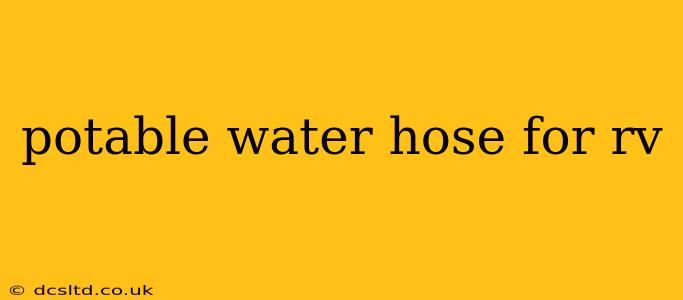Finding the perfect potable water hose for your RV is crucial for ensuring safe and reliable access to clean drinking water during your adventures. A substandard hose can contaminate your water supply, leading to serious health issues. This guide will walk you through everything you need to know to choose the best hose for your needs, addressing common questions and concerns.
What is a Potable Water Hose?
A potable water hose is specifically designed for carrying drinking water. Unlike standard garden hoses, potable hoses are made from materials that won't leach harmful chemicals or toxins into the water. They are typically constructed from non-toxic materials like FDA-approved polyethylene or food-grade vinyl, ensuring your water remains safe for consumption. The term "potable" simply means suitable for drinking.
What are the Key Features to Look for in a Potable Water Hose?
Several factors determine the quality and suitability of a potable water hose for RVs:
-
Material: Look for hoses made from FDA-approved polyethylene or food-grade vinyl. These materials are non-toxic and resistant to algae growth. Avoid hoses made from recycled rubber or materials not explicitly labeled as potable.
-
Reinforcement: A reinforced hose is more durable and less prone to kinking or collapsing under pressure. Look for hoses with multiple layers of reinforcement, often including a braided or spiral-wound inner layer.
-
Length: Consider the distance between your RV's water hookup and your water source. Longer hoses offer more flexibility but can be heavier and more prone to kinking. Many RVers carry multiple shorter hoses for greater convenience.
-
Fittings: Ensure the hose fittings are compatible with your RV's water inlet and the water source's spigot. Standard sizes include 3/4" and 1/2" diameters.
-
Durability: A durable hose will withstand the rigors of RV travel. Look for features like UV resistance to prevent damage from sunlight exposure.
-
Marking: Always check for clear labeling indicating that the hose is potable, non-toxic, and meets FDA standards.
How Long Should My RV Potable Water Hose Be?
The ideal length of your RV potable water hose depends on your specific setup and camping locations. While a 25-foot hose is common, consider whether you'll frequently encounter longer distances between the water spigot and your RV. Many RVers opt for a 25-foot hose and a shorter, more easily maneuverable hose (10-20 feet) for closer campsites.
What are the Different Types of Potable Water Hoses?
While most potable water hoses share similar core features, variations exist in material, reinforcement, and fittings. Some hoses incorporate features such as kink-resistance, built-in strain relief, or specialized couplings for easier connections. Researching specific brands and models can reveal differences in durability and longevity.
How Do I Properly Store My Potable Water Hose?
Proper storage prolongs the life of your potable water hose. After each use, thoroughly rinse the hose with clean water and allow it to dry completely before coiling it loosely and storing it in a cool, dry place, protected from sunlight. Avoid sharp bends or kinks that can weaken the hose.
How Often Should I Replace My Potable Water Hose?
Even with proper care, potable water hoses degrade over time. Inspect your hose regularly for cracks, abrasions, or leaks. Replacing it every 3-5 years, or sooner if damage is detected, is a recommended best practice to ensure the continued safety and purity of your drinking water.
Can I Use a Regular Garden Hose for Drinking Water?
No. Regular garden hoses are not designed for potable water use. They may contain materials that leach harmful chemicals into the water, posing a health risk. Always use a hose specifically labeled as potable.
By carefully considering these factors and choosing a high-quality potable water hose, you can ensure a safe and enjoyable RVing experience with peace of mind knowing your drinking water supply is protected. Remember, your health depends on it!
